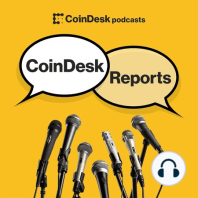64 min listen

MONEY REIMAGINED: Greensill's Collapse and How Blockchains Are Changing Trade Finance
FromCoinDesk Reports
MONEY REIMAGINED: Greensill's Collapse and How Blockchains Are Changing Trade Finance
FromCoinDesk Reports
ratings:
Length:
53 minutes
Released:
Apr 9, 2021
Format:
Podcast episode
Description
Without letters of credit, bills of lading, shipping documents and trillions of dollars in global goods trade would grind to a halt. (And you thought our dependency on the Suez Canal was a problem!)This episode is sponsored by Interpop.ioBut the world’s system of trade finance, a highly complex setup involving banks, insurers, shipping companies, data providers and all manner of intermediaries, is far from ideal. There is massive fraud – check the New York Times’ account of the recent Greensill Capital collapse for – and severe inequity in terms of who gets favorable borrowing terms and who doesn’t. Without access to the trusted data needed to prove their creditworthiness, millions of small-and-medium enterprises are unable to obtain credit to cover the risks associated with exporting their goods. So they either run the risk of non-payment or simply cannot participate in the global economy. As a measure of that inequity, Sheila noted in her monologue to this week’s Money Reimagined episode – in which we talk to two blockchain pioneers trying to fix the trade finance industries many problems – that there’s currently a $1.5 trillion global trade financing gap. But then in his first comments, Tallyx CEO Aditya Menon offered an alternative analysis of how much of the goods trade goes unfinanced and came up with a $5 trillion number. That’s about half of the global trade in goods. Can blockchains and tokenization address these inequities? As you’ll hear from Menon, as well as from Skuchain co-founder Rebecca Liao, the answers lie in figuring out how to incentivize all participants – the exporters, importers, shippers and financiers – to share data in a way that unlocks funding faster. Skuchain is focused on making the information richer and more reliable along the supply chain. Tallyx is figuring out how to turn the contractual information such as invoices into tokens of value that can be traded in ways that allow smaller suppliers to monetize their legitimate receivables.The problems they are trying to solve aren’t easy. But that’s what makes their work so compelling. Blockchain projects like Skuchain and Tallyx offer a healthy reminder that beyond the razzamatazz of crypto markets and celebrity non-fungible tokens, meaningful impact is also possible if you work hard at the core problems faced by real-world entities. --InterPop is building the architecture of an entirely new landscape of fandom using technology built on the Tezos blockchain to drive their vision. Visit hellointerpop.io to learn more.--Image Credit: Mahmoud Khaled/Getty Images NewsSee Privacy Policy at https://art19.com/privacy and California Privacy Notice at https://art19.com/privacy#do-not-sell-my-info.
Released:
Apr 9, 2021
Format:
Podcast episode
Titles in the series (100)
MONEY REIMAGINED: Privacy, Social Media and the Reinvention of Company Towns by CoinDesk Reports